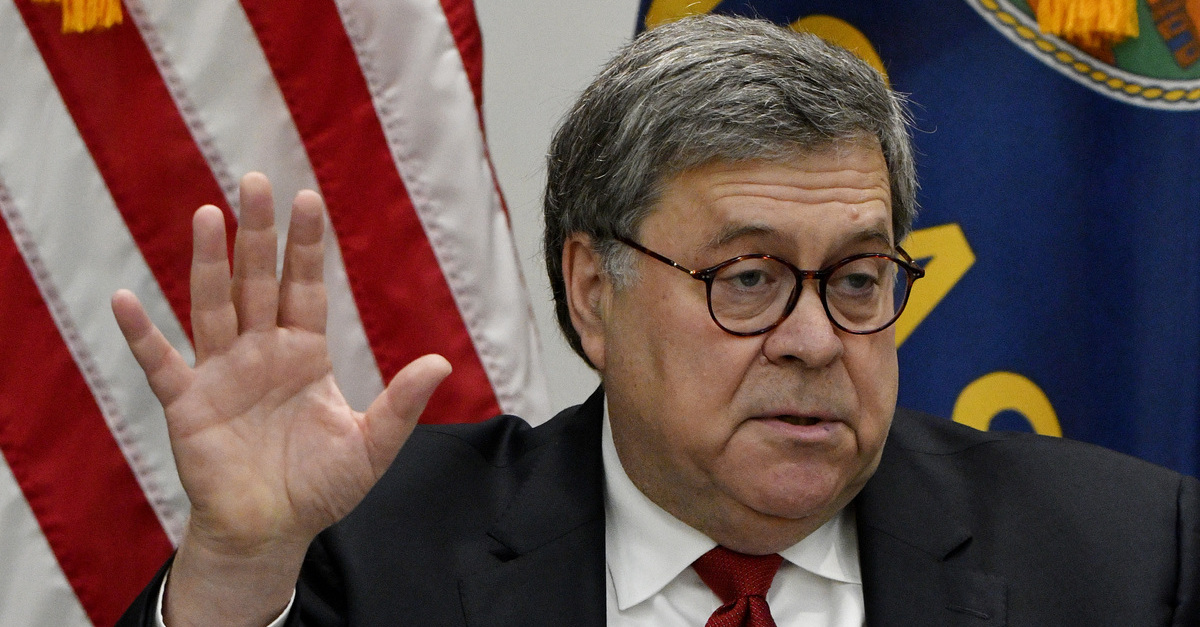
The Department of Justice (DOJ) on Monday filed a motion to appeal a recent federal court ruling that ordered the agency to provide impeachment investigators in the U.S. House of Representatives with grand jury materials underlying former special counsel Robert Mueller‘s report on election interference and obstruction of justice. DOJ attorneys also moved for a stay of that prior decision pending their motion before the D.C. Court of Appeals.
On Friday, U.S. District Judge Beryl A. Howell authored a lengthy and stinging rebuke of the Trump administration’s efforts to keep the information out of the hands of congressional Democrats.
Monday’s nine-page motion for a stay pending appeal begins with a plea that the government be granted a limited reprieve from Judge Howell’s prior decision mandating the disclosure of the full report.
“A stay is warranted because, without a stay, the Department will be irreparably harmed,” the DOJ argues. “Once the information is disclosed, it cannot be recalled, and the confidentiality of the grand jury information will be lost for all time—particularly if Petitioner United States House of Representatives Committee on the Judiciary decides to publicize the now-secret grand jury materials, which it has asserted the power to do through a simple majority vote.”
The Trump administration appears particularly concerned about everyday citizens accessing the Mueller grand jury materials.
“While disclosure to the [House Judiciary Committee] would itself be irreparable harm, disclosure to the public at large would substantially compound it,” DOJ’s Monday filing states.
The motion repeatedly hammers on this point:
Once the information is disclosed, the slate cannot be wiped clean. Even if the information is later clawed back, Members of Congress and their staffs, who are not specifically enumerated as lawful recipients of [grand jury] material, will know what transpired before the grand jury. The Court should not require that momentous step until the appellate court has had a chance to assess its legality. The Court should thus stay its order until the D.C. Circuit has an opportunity to review it.
Aside from repeated calls for secrecy in the name of the state, the stay motion largely focuses its legal arguments on the notion that the House’s ongoing impeachment inquiry doesn’t qualify as a “judicial proceeding” under the Federal Rules of Criminal Procedure.
“Although the Court has rejected the [DOJ]’s legal arguments, those arguments are substantial ones, such that the balance of harms favors preserving the [DOJ]’s ability to appeal,” the motion continues. “For example, there is a substantial question as to whether an impeachment trial constitutes a ‘judicial proceeding’ within the meaning of [Federal Criminal Procedure] Rule 6(e).”
Under the relevant portion of that rule, a “court may authorize disclosure—at a time, in a manner, and subject to any other conditions that it directs—of a grand-jury matter…preliminarily to or in connection with a judicial proceeding.”
Judge Howell determined that the phrase “judicial proceeding” has a broad meaning which would likely encapsulate an impeachment trial. She also found that an impeachment trial is “judicial in nature” and noted that “binding D.C. Circuit precedent forecloses any conclusion other than that an impeachment trial” qualifies as a “judicial proceeding” under the federal rules.
The Trump administration, however, is arguing that Judge Howell might have misread or misinterpreted the precedent cited by the higher court–the same court that DOJ is appealing to now.
“At a minimum, the D.C. Circuit should be permitted to determine the scope and effect of its own decision,” the filing pleads, “and to determine whether, as this Court concluded, [the case law cited by Howell] compels the conclusion that an impeachment trial is a judicial proceeding.”
Attorney, CNN legal analyst and impeachment expert Ross Garber was optimistic about the DOJ’s chances to have the Howell order reversed.
“DOJ appeals court order on disclosure of grand jury info,” Garber tweeted. “As I’ve said, I think there’s a good chance this decision gets reversed on appeal or by Supreme Court. Depends on whether a Senate impeachment trial is a ‘judicial proceeding’ under the Federal Rules of Criminal Procedure.”
[image via Ed Zurga/Getty Images]